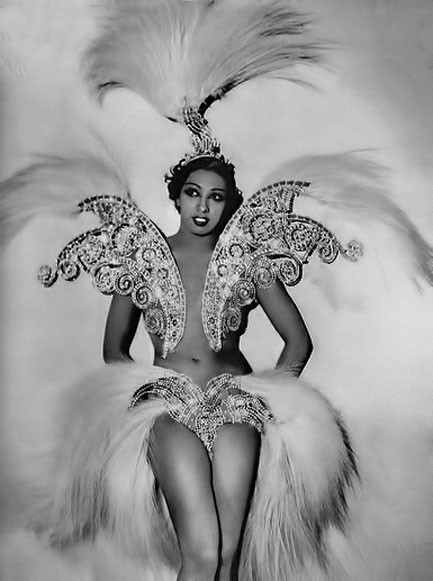Born Freda Josephine McDonald on June 3, 1906 in St. Louis, Missouri, Baker is known as an extremely popular singer and dancer from the 1920-1940’s. As a child, Baker worked as a live-in housekeeper for white families in St. Louis. She dropped out of school at age 12 and began waitressing at the ‘Old Chauffeur’s Club’. At this time, Baker was living on the streets due to complications with her mother, Carrie McDonald, who did not encourage her dreams of becoming an entertainer. In 1921, at age 15, Josephine had a brief marriage to Willie Baker whom she divorced in that same year. Shortly after her divorce, Baker found work with a street performance group called the ‘Jones Family Band’. During her time with Willie Baker her career began to gain traction, and although they were divorced, she kept the last name. Baker’s career began with blackface “comedy” at local clubs, and these performances led to opportunities for her to tour in Paris. In 1925, Baker moved to Paris where she became an instant success for her erotic dancing. In the early 1930’s Josephine starred in two movies, Zou-Zou and Princesse Tam-Tam, and moved her family from St. Louis to Les Milandes, an estate in Castelnaud-Fayrac, France.
Although she was living in France, Baker supported the 1950’s Civil Rights Movement. During a trip to New York with her husband Jo Bouillon, they were refused service at 36 different hotels due to racial discrimination. Josephine was so upset by this treatment that she wrote articles about the segregation of the United States. She also traveled south and gave speeches at different HBCU’s (historically black colleges and universities). Baker also refused to perform for segregated audiences in the United States. She often got calls from people claiming to be from the Ku Klux Klan, but she made public announcements that she was not afraid of them. Baker also worked closely with the NAACP. The organization honored her work by having Sunday, May 20 declared as “Josephine Baker Day”. In 1963 she spoke at the March on Washington alongside Dr. Martin Luther King Jr., she was the only official female speaker. After the assassination of Dr. King, his widow Coretta Scott King approached Baker and asked her to consider taking her husband’s place as leader of the Civil Rights Movement. Baker refused, saying that her children were “too young to lose their mother.”
Josephine Baker died on April 12, 1975 at the age of 68. She left behind her 12 children, longtime boyfriend Robert Brady, and a legacy that will carry on for decades
